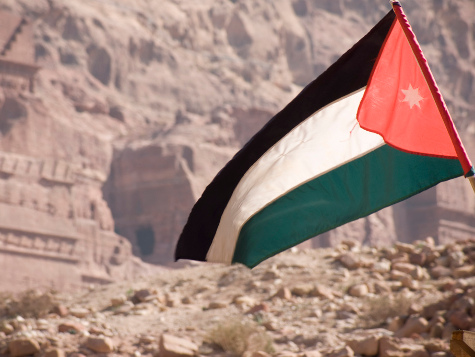The border between Jordan and Israel has been largely quiet for over 40 years. The formal peace treaty between the two countries has been honored for two decades. The two countries’ governments operate closely at the highest levels regarding intelligence and security, and there are several joint projects in the works. King Abdullah II, like his father King Hussein, enjoys a cordial relationship with Israel’s leaders. Sound nice?
We should be very worried.
Beneath that idyllic surface churn forces far less friendly to Israel and the West. Just how much less friendly remains to be seen, but the glimpse we got this week is chilling.
The shooting death on Monday of a Jordanian magistrate judge at a border crossing by Israeli troops lit a fuse in the Hashemite kingdom.
On Monday, according to the initial investigation, Jordanian Raed Zeiter, lunged at a border guard, tried to strangle him and wrestle away the guard’s rifle while shouting “Allahu akhbar,” the Arabic expression meaning “God is great” frequently accompanying terror attacks. He was fatally shot by Israeli soldiers.
Israel’s Prime Minister’s Office prudently expressed regret for the incident and the loss of life, shared with Jordan details of its investigation, and agreed to establish a joint investigation team to look further into the incident.
Unfortunate event, but a reasonable response. Or so one would think. In Amman, however, Jordanian riot police had to maintain control as several hundred angry protesters gathered in front of the Israeli Embassy demanding the Israeli ambassador’s expulsion over the incident and burning Israeli flags.
The police were able to control the crowds, according to embassy commissioner Haim Assaraf, who told Israel Radio that everyone at the mission was safe. But Jordanian media reported that the protesters had attempted to break into the embassy compound, trapping the staff inside for hours.
Members of Parliament expressed outrage at the shooting, with a committee in the Lower House issuing a statement that called for the end of the peace treaty with Israel, the expulsion of Israel’s ambassador in Amman and the removal of Jordan’s envoy in Israel.
The following day, the Jordanian senate called for measures to be taken to put an end to Israeli disrespect, punish the attackers and send a message to the Israeli “occupiers.”
MP Yahya al-Saud called for opening “the gate of jihad” against Israel. MP Mejhem Sqour demanded that the prosecutor-general quickly open a case against the Israel Defense Forces. MP Khalil Atiyeh told The Jordan Times that the event was very serious and that lawmakers would put the “maximum pressure on the government to expel the Israeli ambassador from Amman.”
Jurists in suits and ties, from whom we might expect a more measured response, staged a demonstration at the Palace of Justice. They demanded the extradition of “the Israeli murderers,” burned an Israeli flag, called for the expulsion of Israeli diplomats–and, most disturbingly of all, called for the release of Ahmed Daqamesh from prison.
Who? Daqamesh may not be a household name in most of the world, but he is a hero in much of Jordan. What heroic act, you ask, did he achieve?
In 1997, a group of Israeli schoolgirls were on an excursion to the “Island of Peace”, a border area administered jointly by Jordan and Israel. As they left their bus, Daqamesh, a Jordanian soldier, opened fire on the group, murdering seven girls before his M-16 jammed. He was sentenced to seven life terms.
He has never expressed remorse – in fact, he says that “what I did was my duty.”
He is considered a role model in many mainstream circles for his act against Israeli children. A former Justice Minister agitated for his release, and, last year, two thirds of the members of Jordan’s parliament signed a petition for his freedom.
Such widespread calls for his release reflect a seething hatred for Israel in much of Jordanian society. Israelis and the West remain largely oblivious due to genial interactions with the monarchy and the military, both of which operate closely with Israel and America. The situation is not unlike that of the Egypt-Israel relationship in the last months of President Mubarak’s rule, pre-Arab Spring.
But this week revealed the true feelings of much of the population, including many ostensibly level-headed members of parliament and the legal field.
Jordan faces all manner of destabilizing forces: tensions between the Palestinian majority and the Bedouin-descended natives who rule the land, 600,000 Syrian refugees flooding the country, a large Muslim Brotherhood presence, and a weak economy with severe unemployment, to name just a few.
Just how long the current regime can keep a lid on that is anyone’s guess. Israel and the West should appreciate the cooperation they get from Jordan while it lasts. That may not be for long, and what comes next is unlikely to be so cooperative.

COMMENTS
Please let us know if you're having issues with commenting.